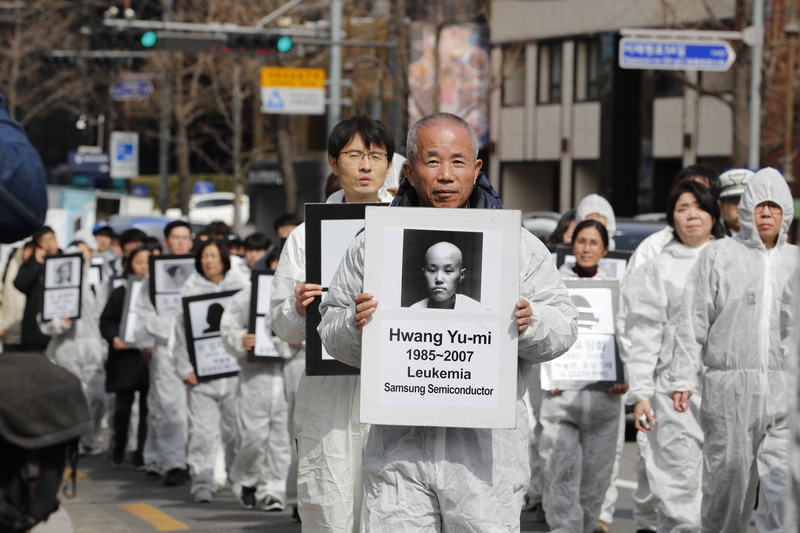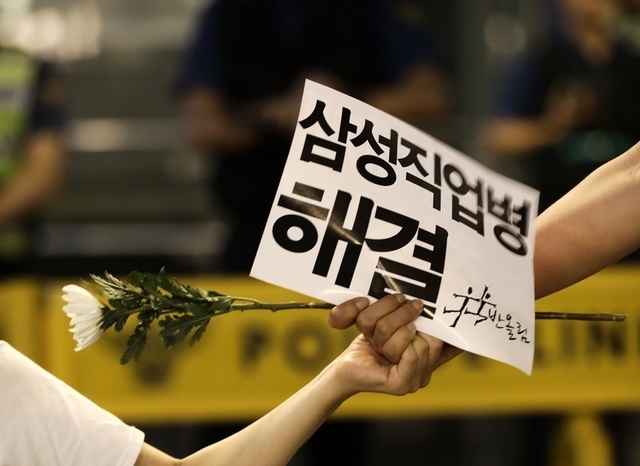 |
|
A memorial march commemorating the 11th anniversary of the death of Hwang Yu-mi, whose death after contracting leukemia while working for a Samsung Semiconductor factory brought the issue of industrial health hazards to the public eye, is held on Mar. 3. The march was led by Hwang Sang-ki, father of the late Hwang Yu-mi, and started in front of Seoul’s Leeum, Samsung Museum of Art and proceeded to the Banollim sit-in in front of the Samsung Electronics building in Seoul’s Seocho District. (Lee Jung-a, staff photographer)
|
Lee Jae-yong may try to boost social credit after damaged caused by Choi Soon-sil scandal
Samsung Electronics’ decision to accept the “final” proposal by the arbitration committee appears to have been substantially influenced by Samsung Electronics Vice Chairman Lee Jae-yong’s upcoming trial at the Supreme Court on charge of bribery. According to this view, Lee accepted a solution to the issue of the leukemia cases at the company’s semiconductor factories – a matter that had gone unsolved for ten years – as a way to boost his social credit. Since this method of arbitration, which is referred to as a “blind trust,” is predicated on accepting whatever remedy results from arbitration, it places a significant burden on Samsung, the party that will have to pay restitution. While the general framework for the arbitration – including the timeline, process and topics – is in place, the specifics are still unknown. Regardless, the company accepted the arbitration committee’s proposal on July 21, ten years after the issue of leukemia became emerged at its semiconductor plants, apparently concluding that the proposal’s advantages outweigh its costs. During the first attempt at arbitration by the committee in 2015, the parties involved came very close to a breakthrough, but the talks broke down when Samsung rejected the committee’s proposal for the establishment of a public interest foundation. Since then, the leukemia issue had remained one of the chief examples of Samsung’s backward approach to labor rights, but the company had shown no signs of proactively seeking a solution. Last April, Samsung Electronics Service (Samsung SVC), a subsidiary of Samsung Electronics, reached an agreement to directly hire around 8,000 subcontractor employees. The decision brought an end to the “no union” policy Samsung Electronics had adhered to for nearly 50 years – a move analysts viewed as both a last-ditch strategy amid an intensifying investigation by prosecutors and a bid to restore trust in Lee Jae-yong ahead of his trial. At the moment, Samsung is working on ideas to restore the images of Lee and the group as a whole after they hit rock bottom over the Choi Soon-sil government interference scandal and various issues that surfaced in its wake. “The semiconductor leukemia cases are a deep-seated issue that has been going on for 10 years,” explained one business world source. “Judging from the way they’re pursuing resolutions now on the ‘no union’ issue and the leukemia issue, it looks like they have Lee Jae-yong’s trial in the back of their minds,” the source suggested.
 |
|
Han Hye-gyeong, who suffered a brain tumor while working at a Samsung LCD factory, holds hands with her mother in front of the Samsung Electronics building in Seoul’s Seocho District on July 4. (Kim Myoung-jin, staff photographer)
|







